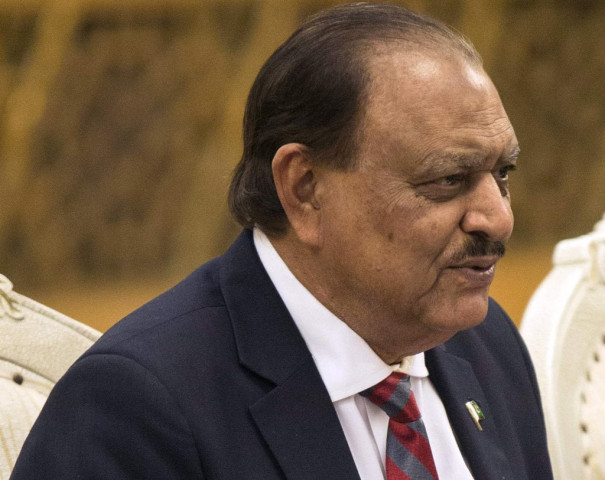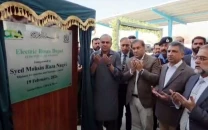Mamnoon promulgates four ordinances to whiten black money
Govt has not announced for beneficiaries immunity from prosecution under certain laws

President Mamnoon Hussain. PHOTO: AFP
The government, for the time being, backed out from the announcement of lowering property tax rates and acquiring the right of taking over the properties by paying the owners higher than the declared prices.
Prime Minister Shahid Khaqan Abbasi had announced to acquire the right to take over property to discourage tax evasion and keep a check on the realty sector.
Real estate players whiten black money worth Rs290b
The government also did not lower the income tax rates for the Association of Persons, which would still pay maximum 35% rates. However, individuals’ income tax rates have been cut with effect from July, who will now pay highest rate of 15% plus a fixed tax for the two highest income slabs.
It appears that the Federal Board of Revenue tried to recoup some of the losses that it sustained due to the prime minister’s decision to steeply cut the income tax and property tax rates.
The Financial Action Task Force’s objections to the amnesty scheme also forced the government to withhold the decision to give immunity from prosecution under National Accountability Ordinance, Federal Investigation Agency Act, Election Commission of Pakistan Act, Anti-Money Laundering Act, Anti-Terrorism Act and Anti-Smuggling Act.
The president promulgated Foreign Assets Declaration and Repatriation Ordinance 2018, Pakistan Economic Reforms Protection Act Amendment Ordinance 2018, the Voluntary Declaration of Domestic Assets Ordinance 2018 and Income Tax Amendment Ordinance 2018.
Mamnoon for countering anti-state narrative
These ordinances will take effect from April 10 and the window to avail the schemes will close on June 30 this year.
“All the four ordinances will have overriding effects on all the existing laws but the proceeds of the crimes cannot be legalised under these pieces of legislation,” said Adviser to Prime Minister on Finance Dr Miftah Ismail while talking to The Express Tribune.
To a question, Dr Ismail said that immunity could not be provided to those who made assets through corruption; therefore, the government did not specifically mention the NAB Ordinance under the clause of immunity.
Dr Ismail said that the issue of acquiring the right to take over properties would be decided in consultation with the provinces, adding that this would be enforced through the Finance Bill that the government would table on April 27.
The government also barred only those politicians, who have held a public office since January 2000, from availing the scheme.
The judges of the courts have also been barred from taking benefit.
All citizens of Pakistan, including non-resident Pakistanis, wherever they may be, except holders of public office, their spouses and dependent children can avail the schemes.\
Despite FBR opposition: NA panel approves tax amnesty for realty sector
Those who have declared their foreign assets would have to pay 3% tax; whereas, for domestic assets 5% tax would be charged.
The declaration of foreign assets would not be used as evidence in any court of law against the declarant.
However, the foreign assets which are disputed in the courts or where proceedings are underway cannot be declared under the scheme.
The government has defined the “foreign assets” as “any movable or immovable assets held outside Pakistan and includes real estate, mortgaged assets, stock and shares, bank accounts, bullion, cash, jewellery, paintings, accounts and loan receivables, beneficial ownership or beneficial interests or contribution in offshore entities and trusts”.
The declaration of foreign assets will be made electronically on Federal Board of Revenue’s web portal and will be valid only if it is accompanied by the evidence of payment of tax.
The value of a foreign asset will be declared in rupees but tax will be paid in dollars. The State Bank of Pakistan (SBP) will notify the mode and manner of repatriation of liquid assets in Pakistan.
The government has assured complete confidentiality to those who would avail the scheme. The information about them even cannot be disclosed under the Right of Access to Information Act, 2017 and any other law for the time being in force.
The ordinance states that if any person discloses any particulars, he will be liable to up to Rs1 million fine or imprisonment for a term not exceeding one year or with both.
Pakistan's laws facilitate money laundering, tax evasion
Income Tax Ordinance
The government has also allowed the FBR to ask about the source of foreign remittances if the value of the remittances exceeds Rs10 million in a tax year. Those who have foreign income and assets will now be required to file their foreign income and assets returns and statements. In case of offshore assets, the FBR has obtained the right to open old cases, abolishing the condition of the five-year-old cases.
Through an amendment in the Protection of Economic Reforms Act of 1992, the government has authorised the FBR to ask the source of dollars being deposited in the foreign currency accounts, partially withdrawing the secrecy clause. This will address the FATF’s concerns.
Moreover, from now onward, only income tax return filers will be allowed to open foreign currency accounts.
Govt mulls taxing remittances
Voluntary declaration
The government has offered the foreign currency accounts holders to declare their liquid assets at only 2% tax. For all the other domestic assets the rate will be 5%. The government has also developed a mechanism to determine the value of domestic assets. The open plot will be valued at either FBR’s valuation or the cost of acquisition, whichever is higher. The superstructures will be assessed at Rs400 per square foot and the apartments at the cost of acquisition or the provincial stamp duty rates, whichever is higher.



















COMMENTS
Comments are moderated and generally will be posted if they are on-topic and not abusive.
For more information, please see our Comments FAQ